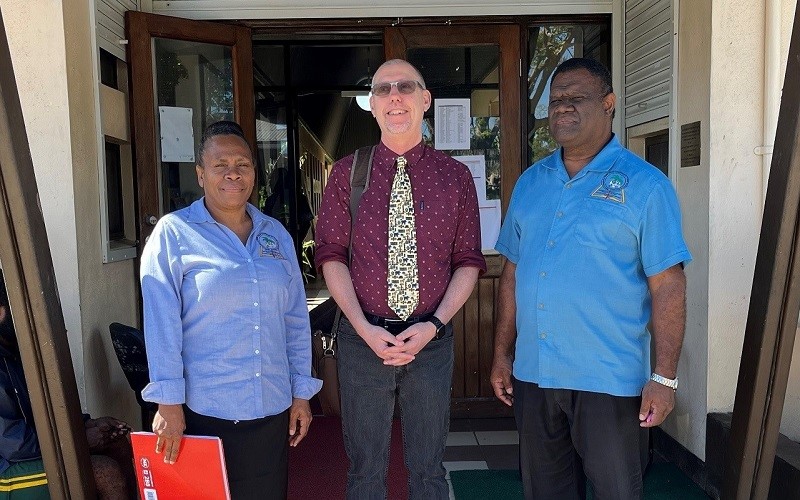
By Dr Tony Mays
Education Specialist, Open Schooling, COL
From 27 to 30 March 2023, I visited Vanuatu to get an update on previous activities and to see how COL might help the education sector in this Pacific island nation post-cyclone. Like other Small Island Developing States (SIDS), Vanuatu is particularly vulnerable to such climactic challenges.
COL initially entered into a memorandum of understanding (MoU) with the Ministry of Education and Training in Vanuatu to develop curriculum-based OER and to submit an evaluation of OER deployment using COL’s Aptus devices for offline access by 2019 as one of the six countries identified to implement the Open and Innovative Schooling model.
A series of natural disasters, including tropical cyclones, drought and volcanic ash fallout, delayed the implementation of the pilot. However, in 2019, a series of training workshops were held to help get back on track, but then 2020 brought the Covid-19 pandemic and saw a system-wide lockdown and the closure of the country’s borders. As things began to open again and vaccines became available to help contain the severity of the pandemic, the country was again hit by a series of natural disasters, most recently Cyclones Judy and Kevin, both within the space of only 48 hours. The Ministry is currently coordinating recovery efforts from its Emergency Operations Centre. Given the continuing disruption of traditional campus-based provisions, there is a need to accelerate both the digitisation of the curriculum and the use of alternative models to campus-based provision.
Ms Marie Jonah, National Education Programme Coordinator and COL’s Focal Point in the Ministry coordinates the post-cyclone recovery of schooling provision. She noted that many school buildings were damaged, and many school supplies, including textbooks, were destroyed. On a positive note, “More than 70 per cent of schools are now internet connected”, which has aided recovery coordination and opened up new possibilities for future provision. She observed that while Vanuatu was experiencing attrition of learners in many areas, in inner-city schools like Port Vila, class sizes were now 2 to 2.5 times the Ministry’s established norm. Both scenarios indicate the need for alternative modes of provision.
Recently, the Ministry has seen the need to create a new Directorate of Distance Education within the Ministry. Mr John Kaltau, the Director of Tertiary Education charged with creating the new structure, said he would appreciate COL’s guidance in this process. In addition, he noted that for the growing numbers of youths not in employment nor in education or training (NEETs), a more vocationally-oriented curriculum would be most appropriate. However, the Vanuatu Institute of Technology, which offers such courses, is already at capacity for full-time placements. Although new campuses will be added in due course to increase capacity, there is a need to develop more flexible multi-modal pathways for provision, including distance, blended and online learning.
While in country, I developed a concept note that included short-term activities to address immediate challenges. I also mooted the notion in the longer term of creating a virtual open college as a semi-autonomous structure to offer both fully online courses as well as supporting blended learning through a hubs and spokes model in partnership with mainstream schools and colleges already internet-connected.
Discussions are continuing with Vanuatu, but COL’s open schooling initiative, recognising that climate change and other factors already impact negatively on the education of at least 40 million children per year, is pushing ahead with the voluntary support of several teachers in our partner organisations along with the development of a short course for secondary school learners to empower them both to cope with the climate change crisis and actively to seek to mitigate it. The new course content should become available by the end of June 2023 and is part of a broader strategy by COL to heed its own advice on transforming education for climate action.


